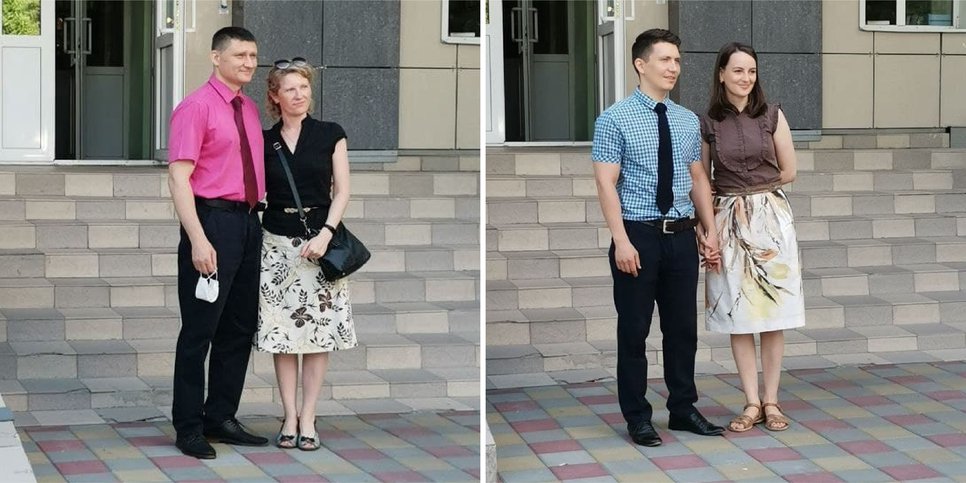In the photo: Alexei Berchuk and Dmitry Golik with their wives before the sentencing
In the photo: Alexei Berchuk and Dmitry Golik with their wives before the sentencing
Breaks Records of Cruelty: in Blagoveshchensk, the Court Sentenced Believer Aleksey Berchuk to Eight Years in Prison and Dmitriy Golik to Seven Years
Amur RegionOn June 30, 2021, the judge of the Blagoveshchensk City Court of the Amur Region, Tatyana Studilko, set a new record for the cruelty of a sentence to peaceful believers. Two believers were found guilty of organizing the activities of the Jehovah's Witnesses community, which was recognized as extremist. They were sentenced to 7 and 8 years in prison, they were taken into custody.
The punishment is in line with what the prosecutor recommended. There are no victims in the case. The believers insist on their complete innocence. The verdict has not come into force and can be appealed.
When addressing the court with his last word, Aleksey Berchuk said: "For me, the humiliation of human dignity, undermining of the foundations of the constitutional order, and incitement of religious or racial hatred are unacceptable. During the whole trial, the prosecution failed to bring a single piece of evidence to the contrary! Sadly, the fact that I read the Bible, talked about biblical themes, and prayed to God with the perpetrators is considered by the prosecution as extremism."
Dmitriy Golik said in his last statement: "I do not need any organization or legal entity to worship God. Moreover, I am against extremism, its manifestations, and the very incitement of religious hatred. I am against it, but for some reason, I am accused of it. What connection there is between me and extremism, I never understood."
On July 20, 2018, at least three Jehovah's Witnesses' homes in Blagoveshchensk were searched. A month before the searches, on June 22, 2018, the Federal Security Service of Russia in the Amur region opened a criminal case.
In the summer of 2018, operatives installed a listening device in the apartment of Dmitry and Kristina Golik. Thus, law enforcement officers invaded privacy, violating the rights of peaceful believers to inviolability of the home, personal, and family secrets. Dmitriy Golik has been under house arrest for almost three years. He says, "This is certainly an ordeal for Kristina. We haven't been to her homeland in four years. My parents are also very worried about being persecuted, and it's bad for their health."
Aleksey Berchuk was detained at the Moscow airport on January 21, 2019. He spent 2 days in the capital's temporary detention center, after which he was forced to return with an investigator to Blagoveshchensk. "I was worried about my wife, I didn't know what was wrong with her," Aleksey recalls. - The uncertainty added to my anxiety. After the temporary detention center, the FSB officers took me 6,000 kilometers away, to the Far East. We were separated from his wife for more than a month." The believer was under house arrest for about two and a half years.
The investigation lasted more than a year and a half, and the case went to trial on February 6, 2020. All witnesses in the case characterized the defendants positively. Nikolay Karendov, an FSB operative, admitted that the religion of Jehovah's Witnesses was not banned and that he had not heard any appeals violating Russian law at Jehovah's Witnesses' services.
Aleksey Berchuk and Dmitriy Golik were prosecuted along with 13 other Jehovah's Witnesses from the Amur region.
The previous record for the severity of the sentence was set in the Krasnodar Territory. There, 63-year-old believer Aleksandr Ivshin was sentenced to 7.5 years in a penal colony; his sentence has already come into force; the believer is serving his sentence in the Rostov-on-Don penal colony.
Russian security forces mistakenly interpret citizens' exercise of their constitutional rights as extremist activity. Numerous human rights organizations in Russia and beyond have repeatedly called for a halt to the wave of religious repression.
"All people, including Jehovah's Witnesses, should be able to peacefully exercise their rights, including the right to freedom of religion, peaceful assembly, and expression without discrimination, as guaranteed by the Russian Constitution and Russia's commitments to OSCE and international law," the Organization for Security and Cooperation in Europe (OSCE) said on July 23, 2020.


